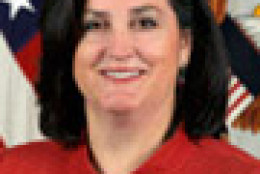Army
-
WASHINGTON (AP) — The Army reprimanded a two-star general for poor judgment in “creating the perception” of undue favoritism in the awarding of a no-bid government contract, and the military will soon decide whether he…
June 23, 2015 -
The military is losing faith because of budget impasses. That\'s the judgement of retired Army Gen. Gordon Sullivan, president and CEO at the Association of the U.S. Army. He\'s former Chief of Staff of the Army, and is writing about the problem in The Hill newspaper. He tells In Depth with Francis Rose the problem is due to the lack of budget certainty, and the amount of money the military gets from Congress.
June 22, 2015 -
The Army is reexamining its recruitment process. The ultimate goal is to refine the recruiting process so the service still attains top-notch soldiers without \"industrial age\" metrics that only measure raw numbers of recruits.
June 16, 2015 -
The U.S. Army marked its 240th birthday with solemn ceremonies, plenty of cake and dancing, a fun run and more during two weeks of festivities. The Second Continental Congress created the Army on June 14, 1775. The next day, George Washington agreed to be the Army\'s first commander.
June 15, 2015 -
What if you\'re paying a fixed price for services, but the contractor starts to fall down on the job? That\'s what happened to the Army in Afghanistan. It hired a company called Mansoor International to provide trucking. Mansoor was paid a fixed price for each trip, but then things started to go wrong. Joe Petrillo, a partner at the law firm Petrillo and Powell, joined Tom Temin on the Federal Drive for more on the case and the lessons learned we turn to procurement attorney Joe Petrillo, a partner at the law firm Petrillo and Powell.
June 11, 2015 -
The Army is preparing for a more sustainable and adaptable force with the release of the Energy Security and Sustainability Strategy. The plan focuses on ways to optimize resource management and how a more careful use of energy, water and land can help the Army\'s mission. Katherine Hammack, the Assistant Secretary of the Army for Installations, Energy and the Environment, joined Tom Temin on the Federal Drive with more information on the plan.
June 11, 2015 -
Brad Carson, DoD\'s new acting undersecretary for personnel and readiness has until August to deliver recommendations on how to revamp the military personnel system. But in public comments Tuesday, he suggested a major shakeup is in order.
June 10, 2015 -
Secretary of the Army John McHugh notified President Barack Obama that he planned to step down no later than Nov. 1.
June 08, 2015 -
The Army says it's taking the DoD directive to trim its headquarters staff extremely seriously. And that's not just because it will save money. The service's number two civilian sees it as an opportunity to flatten what he calls a "sclerotic" bureaucracy, which does a poor job of responding to changing circumstances and urgent needs. Federal News Radio DoD Reporter Jared Serbu has the details.
April 01, 2015 -
Even if Congress finally finds a way around sequestration, the drawdown plan the Army has already laid out would take it down to a size of 450,000 soliders within the next five years. Officials said they won't be able to shed 40,000 personnel just through attrition. As Federal News Radio's Jared Serbu reports, the Army is expected to involuntarily separate at least 14,000 more soldiers, and thousands more if the budget caps stay in effect.
March 25, 2015 -
In our latest online chat, Doug Wiltsie, head of the Army's Program Executive Office Enterprise Information Systems, discusses budget pressures, the move to agile development, acquisition innovation and cyber, among other topics.
March 24, 2015 -
When the Obama administration released its 2016 budget request last month, it left some areas sort of blank. Case in point: The IT spending details for the Navy and Army, two of the biggest technology spenders in the government. Bloomberg Government analysts raided the IT dashboard this month to find some of the missing data. Bloomberg quantitative analyst Jesse Holler joined Tom Temin on the Federal Drive with a clearer picture of Army and Navy IT plans.
March 23, 2015 -
At the end of last year, Congress ordered up a new commission to study the Army's future. We now know who will serve on that eight-member study panel.
March 23, 2015 -
As one of the military's highest-ranking women and its first openly gay general, Brig. Gen. Tammy Smith, has a busy speaking calendar, especially around this time of year. It's women's history month. Smith is the deputy chief of staff of the Army Reserve, which prides itself on having women in 95 percent of its occupations. Federal News Radio Reporter Emily Kopp asked Smith whether she thought the Army Reserve was more welcoming to women than other parts of the military.
March 19, 2015 -
Two priorities shape the way the United States Army will drive its business: Warfighting and enterprise information environment mission areas. Those priorities are more important in an Army where human power, and budget, is getting smaller. Doug Wiltsie is program executive officer for Enterprise Information Systems for the Army. On In Depth with Francis Rose, Doug laid out three priorities for 2015 and he says the first one is uninterrupted capability delivery.
March 18, 2015









